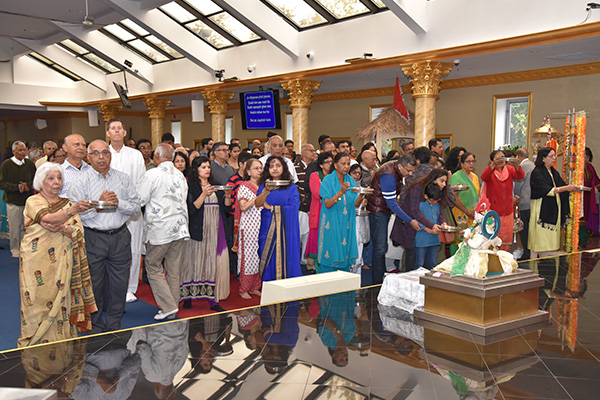Below is the list of some of the services offered at Vishnu Mandir
Pujas
Priests at Vishnu mandir are able to perform pujas throughout the year for devotees. Below is the short list but not limited to the following. For further enquiries, drop us a email on [email protected].
Samaskaras
Samaskaras are the Hindu rituals or rites of passage – Ceremonies that mark important transitional periods in a person’s life, such as Birth, Upnayan (Janeo), marriage, having children, and death. Priests at Vishnu Mandir are able to perform pujas for all 16 of the major samskaras.
Garbhadhana
(Conception)
This samskara is performed by parents and consists of fervent prayer for a child in order to fulfil the obligation to continue the human race.
Punsavana
(Fetus protection)
This samskara is performed during the third or fourth month of pregnancy. A priest recites Vedic hymns to invoke divine qualities in the child.
Simantonnayana
(Satisfying the cravings of the pregnant mother)
This samskara is similar to a baby shower, and is, performed during the seventh month of pregnancy when prayers are offered to God for the healthy physical and mental growth of the child.
Jatakarma
(Child birth)
Mantras are recited for a healthy and long life of the child at his birth.
Namakaran
(Naming the child)
The name for the baby is selected such that its meaning can inspire the child to follow the path of righteousness.
Nishkramana
(Taking the child outdoors for the first time)
This samskara is performed in the fourth month after birth when the child is moved outside the house.
Annaprasana
(Giving solid food)
In the sixth, seventh or eighth month child is given solid food.
Chudakarma a.k.a. Mundan
(Hair cutting)
This is performed during the first or third year of age when the child’s hair is removed by shaving.
Karnavedha
(Ear piercing)
This samskara is performed in the third or fifth year.
Upanayana
(Sacred thread ceremony)
This introduces the male child to a teacher in order to receive education and marking the entry of the child to Brahmacharya.
Vedarambha
(Study of Vedas)
This samskara is performed at the time of Upanayana or within one year. The Guru teaches the Gayatri Mantra.
Samavartana
(Returning home after completion of education)
This samskara is performed at the age of about 25 years.
Vivaha
(Marriage)
Vanaprastha
(Preparation for renunciation)
This samskara is performed at the age of 50 to celebrate the departure from the householder stage to the Vanaprastha stage when the person begins to engage in spiritual activities.
Sannyasa
(Renunciation)
This samskara is performed after Vanaprastha.
Upanayana
(Sacred thread ceremony)
This introduces the male child to a teacher in order to receive education and marking the entry of the child to Brahmacharya.
Vedarambha
(Study of Vedas)
This samskara is performed at the time of Upanayana or within one year. The Guru teaches the Gayatri Mantra.
Samavartana
(Returning home after completion of education)
This samskara is performed at the age of about 25 years.
Antyesthi
(Cremation)
This is the final samskara performed after death by his or her descendents.
Kirtan
Vishnu Mandir chowki group is available to perform mata chowki for your special occasions. The group does chowki only in the temple.
The Kirtan group is an integral part of the all temple pujas. They do a satsangh with the seniors at Vishnu Mandir’s Anand Bhawan (Senior Home) every fortnight.



